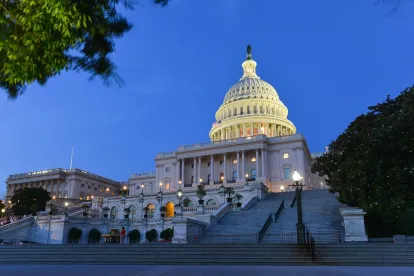This Week’s Dose
The Senate Finance Committee explored the extension of various public health emergency flexibilities, including telehealth and hospital-at-home. The Health Resources & Services Administration (HRSA) threatened enforcement action against drug manufacturers denying 340B pricing.
Congress
Senate Finance Committee Discussed Flexibilities Beyond the Pandemic
The Finance Committee explored potential extension of waivers and flexibilities tied to the COVID-19 Public Health Emergency (PHE). During the hearing, witnesses and Senators recognized the critical role that telehealth has played during the PHE in advancing health equity, but consensus around which policies to make permanent remained elusive. Some Senators called for additional study of the impact of telehealth on quality, utilization and health care spending before making telehealth flexibilities permanent. In addition, many Senators were specifically supportive of the hospital-at-home waivers, which have been used during the pandemic to expand the healthcare delivery system by allowing acute care services typically provided in a hospital setting to be delivered in the patient’s home. Many existing flexibilities that are tied to the PHE will expire without Congressional action, however, and the legislative path forward from here remains murky.
Senate Judiciary Committee Examined Impacts of Hospital Consolidation
Witness testimony largely focused on negative aspects of hospital consolidation, suggesting that it leads to higher health care prices, lower wages for health care workers, and less choice for patients. Testimony also attributed hospital consolidation to government policies that encourage providers to consolidate, such as health care anti-abuse laws, Medicare payment rules, licensing, certificate of need laws and potentially the growing role of private equity ownership. Notwithstanding these concerns, members and witnesses also discussed how integrated health systems were able to leverage their scale to respond effectively to the pandemic. Chairwoman Klobuchar (D-MN) indicated that the Department of Justice and the Federal Trade Commission should consider revising guidance regarding antitrust enforcement practices.
House Passed the Fairness in Orphan Drug Exclusivity Act
The bill, sponsored by Rep. Madeleine Dean (D-PA), aims to close a longstanding loophole for orphan drugs—a designation given by the U.S. Food and Drug Administration to drugs that are developed to treat rare diseases or for which the manufacturer does not expect to recoup development costs. This designation comes with seven years of market exclusivity for the drug, but scrutiny over drug prices has led lawmakers to examine how manufacturers use the designation. Rep. Dean’s bill would require manufacturers to show that they will not recover costs within the first 12 years the drug is marketed prior to granting the exclusivity. The bill passed the house 402-23. It is unclear whether it will get picked up in the Senate.
Administration
HRSA Issued Letters to Six Major Drug Manufacturers on 340B Obligations
In notices issued to manufacturers on Monday, HRSA warned that these drug manufacturers were required to sell drugs at the 340B ceiling price to contract pharmacies and that sales could not be conditioned on the collection of additional data. In what could be a significant step forward in protections for 340B covered entities, the agency warned that failure to comply could result in the imposition of civil monetary penalties. On Thursday, one manufacturer responded by filing an emergency motion for stay of any enforcement action that HRSA might take for noncompliance.
HHS Announced Funding to Abate Mental Health Crisis, Substance Abuse.
The Substance Abuse and Mental Health Services Administration will distribute $3 billion secured under the American Rescue Plan Act through two block grant programs aimed at mental health and substance abuse treatments. Early in the pandemic, experts worried that mental health and opioid abuse epidemics would intensify during long periods of social isolation and financial instability, exacerbating existing public health crises of suicide and substance abuse. The infusion of resources into community behavioral health research and programming comes alongside the establishment of a Behavioral Health Coordinating council to “facilitate collaborative, innovative, transparent, equitable, and action-oriented approaches to addressing the [Department of Health and Human Services] behavioral health agenda.” The funds will be distributed to the states and generally administered by state public health and/or social service departments.
States and Courts
Texas Filed Lawsuit to Reinstate Medicaid 1115 Waiver Revoked by Biden Administration
In April, the Biden administration revoked a 10-year extension to Texas’ Medicaid demonstration program that would have continued to help offset unfunded care and provide services for Texas’ low-income uninsured population. The Attorney General for the State of Texas has viewed this as an attempt by the Biden Administration to force negotiations with Texas to expand Medicaid. CMS, which has jurisdiction over waiver approval, stated that Texas should not have been exempt from public notice and comment before the Trump Administration granted the waiver. Now, Texas is suing the agency, claiming that CMS violated administrative procedures and overreached in its authority, posing a significant threat of disruption to safety net care in the state. Simultaneously, Texas is resubmitting the same waiver, this time allowing for the previously foregone public comment period.
Quick Hits
-
In the Senate, the Appropriations Committee examined the President’s Budget for the Centers for Disease Control and Prevention; the Homeland Security Committee held the second part of a series on the U.S. medical supply chain; and the Health and Retirement Subcommittee looked at issues in the healthcare workforce.
-
The House Oversight Committee held a hearing on drug pricing on the same day it released a report on price increases of two widely used biologics products.
-
In a proclamation issued last Friday, President Biden reversed a policy that allowed the government to deny entry to immigrants who are not able to get health insurance coverage within 30 days of coming to the U.S., as well as a rule that allowed green card denials for immigrants who had used government funded programs like Medicaid.
-
New CMS data shows that the pandemic has resulted in millions of foregone visits by Medicaid and Children’s Health Insurance Program beneficiaries, raising concerns over long-term health impacts, especially for mental health.
-
Four Democratic lawmakers called for suspension of the Global and Professional Direct Contracting Models.
-
A bipartisan group of lawmakers asked Secretary Becerra to extend the Next Generation Accountable Care Organization Model for one-year, highlighting its value to care coordination and cost-savings to Medicare.
Next Week’s Diagnosis
The House Appropriations Committee looks at budget requests for the Centers for Disease Control and Prevention, Defense Health and Readiness and the National Institutes of Health. House Energy and Commerce will hold a hearing addressing vaccine confidence. The Senate Appropriations Committee will also review the NIH budget.







 />i
/>i

